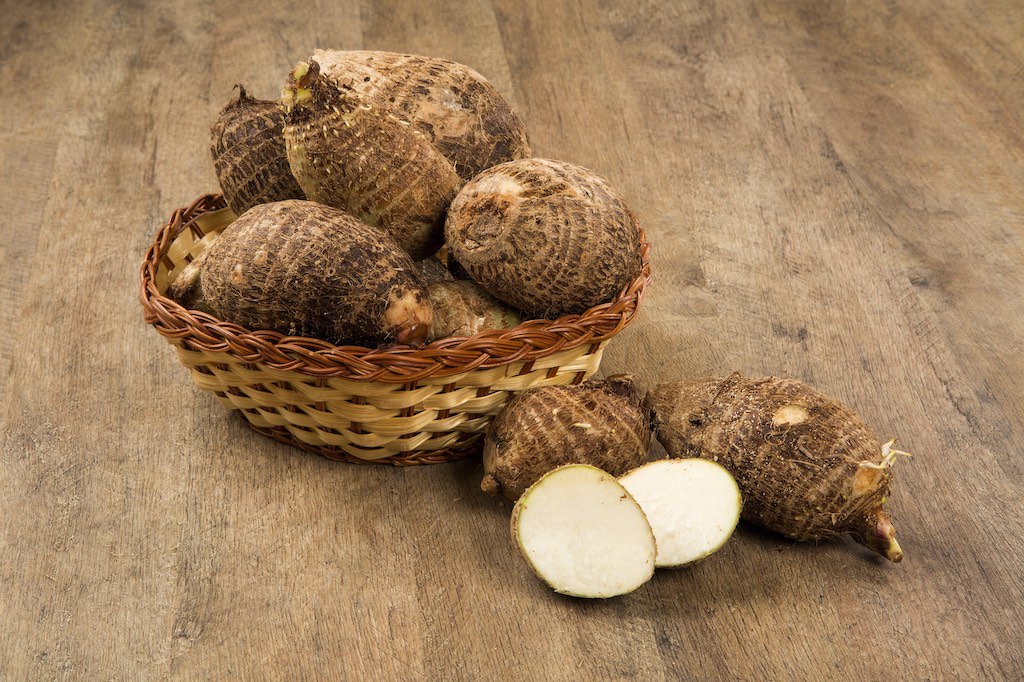15 Amazing Health Benefits of Eating Malanga as Part of a Healthy Diet

Malanga, also known as Xanthosoma sagittifolium, is a tropical root vegetable that is highly nutritious and offers numerous health benefits when incorporated into a balanced diet. Often compared to other root vegetables like taro or potatoes, malanga is rich in fiber, vitamins, minerals, and complex carbohydrates. Its versatility in the kitchen and its impressive nutritional profile make it an excellent addition to a healthy diet.
In this article, we’ll explore 15 amazing health benefits of eating malanga, highlighting why this starchy tuber deserves a place in your daily meals.
1. Supports Digestive Health
Malanga is an excellent source of dietary fiber, which is crucial for maintaining a healthy digestive system. The fiber in malanga helps add bulk to stool, promoting regular bowel movements and preventing constipation. Fiber also aids in the growth of beneficial gut bacteria, which play a critical role in digestive health. Additionally, because malanga is easy to digest, it is often recommended for people with sensitive stomachs or digestive disorders like irritable bowel syndrome (IBS).
Including malanga in your diet can help maintain smooth digestion and promote overall gut health.
How It Helps:
- Adds bulk to stool and promotes regular bowel movements
- Feeds beneficial gut bacteria, supporting gut microbiome health
- Easy to digest, making it suitable for people with digestive issues
2. Rich in Complex Carbohydrates
Malanga is a great source of complex carbohydrates, which provide a steady and sustained source of energy. Unlike simple carbohydrates, which cause spikes in blood sugar levels, complex carbs are digested more slowly, helping maintain stable energy levels throughout the day. This makes malanga an ideal choice for those looking to avoid blood sugar crashes and maintain consistent energy, especially for individuals with diabetes or those looking to manage their blood sugar levels.
Adding malanga to your meals can offer long-lasting energy without the spikes and crashes associated with refined carbs.
How It Helps:
- Provides sustained energy due to slow digestion of complex carbs
- Helps regulate blood sugar levels
- Ideal for diabetics and those looking for long-lasting energy
3. Boosts Immune System
Malanga contains essential nutrients that can help strengthen the immune system, particularly vitamin C and antioxidants. Vitamin C is known for its ability to enhance the production of white blood cells, which are vital for fighting off infections and illnesses. Antioxidants in malanga help neutralize free radicals, which can damage cells and weaken the immune system. Regular consumption of malanga can help support your body’s natural defenses.
How It Helps:
- Rich in vitamin C, boosting immune function
- Contains antioxidants that protect cells from oxidative damage
- Helps the body fight infections and illnesses
4. Supports Heart Health
Malanga is high in potassium, a mineral that helps regulate blood pressure by counteracting the effects of sodium in the body. A potassium-rich diet is essential for maintaining cardiovascular health and reducing the risk of hypertension and heart disease. Additionally, the fiber in malanga can help lower cholesterol levels, further supporting heart health.
By incorporating malanga into your diet, you can help promote better heart health and reduce the risk of cardiovascular issues.
How It Helps:
- High potassium content helps regulate blood pressure
- Fiber supports lower cholesterol levels
- Reduces risk of heart disease and hypertension
5. Gluten-Free and Hypoallergenic
For those with gluten intolerance or celiac disease, malanga is a fantastic alternative to other starchy vegetables like wheat or potatoes. Malanga is gluten-free and is less likely to cause allergic reactions, making it suitable for individuals with food sensitivities or allergies. It is often recommended as part of an elimination diet to identify food intolerances due to its hypoallergenic properties.
Including malanga in a gluten-free diet provides a safe, nutritious option for those with gluten sensitivities or allergies.
How It Helps:
- Naturally gluten-free and hypoallergenic
- Ideal for those with celiac disease or gluten intolerance
- Safe for individuals with food sensitivities
6. Promotes Healthy Skin
Malanga contains vitamin E and vitamin C, both of which are essential for maintaining healthy skin. Vitamin E acts as an antioxidant, protecting the skin from oxidative stress caused by UV rays and environmental pollutants. Vitamin C promotes collagen production, which helps keep the skin firm, smooth, and youthful. Regular consumption of malanga can contribute to clearer, healthier skin and reduce the signs of aging.
How It Helps:
- Vitamin E protects skin from oxidative damage
- Vitamin C supports collagen production for firm, youthful skin
- Promotes overall skin health and reduces signs of aging
7. Helps Regulate Blood Sugar Levels
Malanga’s low glycemic index (GI) makes it an excellent food choice for people with diabetes or those looking to manage their blood sugar levels. Foods with a low GI are digested and absorbed more slowly, which helps prevent rapid spikes in blood sugar levels. The complex carbohydrates in malanga are broken down gradually, leading to more stable glucose levels.
Incorporating malanga into your diet can help you maintain healthy blood sugar levels and prevent insulin resistance.
How It Helps:
- Low glycemic index helps regulate blood sugar
- Slows absorption of carbohydrates, preventing spikes
- Ideal for individuals with diabetes or prediabetes
8. Rich in Essential Vitamins and Minerals
Malanga is packed with essential vitamins and minerals, including vitamin C, vitamin B6, magnesium, potassium, and phosphorus. These nutrients play important roles in various bodily functions, including energy production, immune function, muscle contraction, and bone health. Including malanga in your diet helps ensure that your body gets the essential nutrients it needs for optimal function.
How It Helps:
- Provides a rich source of vitamins and minerals
- Supports energy production, bone health, and immune function
- Helps meet daily nutritional requirements
9. Aids in Weight Management
Due to its high fiber content and low glycemic index, malanga can be an excellent food for those looking to manage their weight. Fiber helps promote a feeling of fullness and satiety, which can prevent overeating and reduce the temptation to snack between meals. Additionally, the slow digestion of complex carbohydrates in malanga helps maintain steady energy levels, reducing cravings for sugary or high-calorie foods.
By adding malanga to your meals, you can support healthy weight management and curb overeating.
How It Helps:
- Promotes satiety, helping control appetite
- Low glycemic index prevents spikes in hunger
- Ideal for individuals aiming to manage or lose weight
10. Supports Bone Health
Malanga is rich in calcium and magnesium, two essential minerals for maintaining strong bones and preventing bone loss. Calcium is necessary for the development and maintenance of healthy bones, while magnesium helps the body absorb calcium more efficiently. Regular consumption of malanga can help reduce the risk of osteoporosis and other bone-related issues.
Including malanga in your diet can support bone density and overall skeletal health.
How It Helps:
- High calcium content supports bone strength
- Magnesium aids in calcium absorption
- Reduces risk of osteoporosis and bone loss
11. Improves Brain Function
Malanga contains vitamin B6, which is essential for brain health and cognitive function. Vitamin B6 plays a crucial role in the production of neurotransmitters like serotonin and dopamine, which regulate mood and mental clarity. Regular consumption of malanga can help improve memory, focus, and overall brain function, making it beneficial for cognitive health.
How It Helps:
- Vitamin B6 supports neurotransmitter production
- Enhances cognitive function and memory
- Promotes mental clarity and focus
12. Supports Muscle Function
The potassium and magnesium in malanga play essential roles in maintaining healthy muscle function. Potassium helps regulate muscle contractions and prevents cramps, while magnesium supports muscle relaxation and recovery after physical activity. Malanga’s nutrient profile makes it an excellent food choice for athletes or those looking to support their muscle health.
How It Helps:
- Potassium helps regulate muscle contractions
- Magnesium supports muscle recovery
- Prevents cramps and promotes healthy muscle function
13. Promotes Healthy Heart Rhythm
The potassium in malanga is also essential for maintaining a healthy heart rhythm. Potassium helps regulate the electrical activity in the heart, ensuring a steady, regular heartbeat. A diet rich in potassium can help reduce the risk of arrhythmias and support overall heart health. By adding malanga to your meals, you can help maintain a healthy heart rhythm and reduce the risk of heart-related issues.
How It Helps:
- Potassium regulates heart rhythm
- Supports overall cardiovascular health
- Reduces risk of arrhythmias
14. Anti-Inflammatory Properties
Malanga contains anti-inflammatory compounds that can help reduce inflammation throughout the body. Chronic inflammation is linked to various health conditions, including heart disease, diabetes, and arthritis. By including malanga in your diet, you can help lower inflammation and protect against these conditions.
How It Helps:
- Reduces inflammation in the body
- Helps manage chronic inflammatory conditions
- Protects against inflammation-related diseases
15. Supports Eye Health
Malanga is rich in antioxidants like vitamin A and beta-carotene, which are essential for maintaining eye health and preventing age-related vision problems like macular degeneration and cataracts. Vitamin A supports retina function and helps maintain clear vision, especially in low-light conditions.
By consuming malanga regularly, you can support your vision and protect your eyes from age-related conditions.
How It Helps:
- Rich in vitamin A and beta-carotene, supporting eye health
- Protects against macular degeneration and cataracts
- Promotes clear vision and retina health
Conclusion
Malanga is a highly nutritious root vegetable that offers numerous health benefits when incorporated into a healthy diet. From supporting digestive health and immune function to promoting heart health, brain function, and weight management, malanga is a versatile and beneficial addition to any meal plan. Its rich nutrient profile, hypoallergenic properties, and low glycemic index make it an ideal choice for individuals with digestive sensitivities, food allergies, or those looking to improve their overall health. By including malanga in your diet, you can enjoy these amazing health benefits and enhance your well-being.



